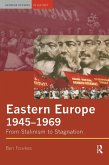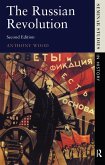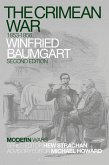Why is Eastern Europe still different from Western Europe, more than a quarter-century after the collapse of Communism? A History of Eastern Europe 1918 to the Present shows how the roots of this difference are based in Eastern Europe's tortured 20th century.
Eastern Europe emerged in 1918 as the 'lands between', new states whose weakness vis-à-vis Germany and Soviet Russia soon became obvious. The region was the main killing-field of the Second World War, which visited unimaginable horrors on its inhabitants before their 'liberation' by the Soviets in 1945. The imposition of Communist dictatorships on the region, ironically, only deepened Eastern Europe's backwardness. Even in the post-Communist period, its problems continue to make it a fertile breeding-ground for nationalism and political extremism.
A History of Eastern Europe 1918 to the Present explores the comparative backwardness of Eastern Europe and how this has driven strategies of modernisation; it looks at the ways in which the region has served as a giant test-tube for political experimentation and, in particular, at the enduring strength of nationalism, which since 1989 has re-emerged more virulent than ever.
This book in the essential textbook for any student of 20th-century Eastern Europe.
Eastern Europe emerged in 1918 as the 'lands between', new states whose weakness vis-à-vis Germany and Soviet Russia soon became obvious. The region was the main killing-field of the Second World War, which visited unimaginable horrors on its inhabitants before their 'liberation' by the Soviets in 1945. The imposition of Communist dictatorships on the region, ironically, only deepened Eastern Europe's backwardness. Even in the post-Communist period, its problems continue to make it a fertile breeding-ground for nationalism and political extremism.
A History of Eastern Europe 1918 to the Present explores the comparative backwardness of Eastern Europe and how this has driven strategies of modernisation; it looks at the ways in which the region has served as a giant test-tube for political experimentation and, in particular, at the enduring strength of nationalism, which since 1989 has re-emerged more virulent than ever.
This book in the essential textbook for any student of 20th-century Eastern Europe.









